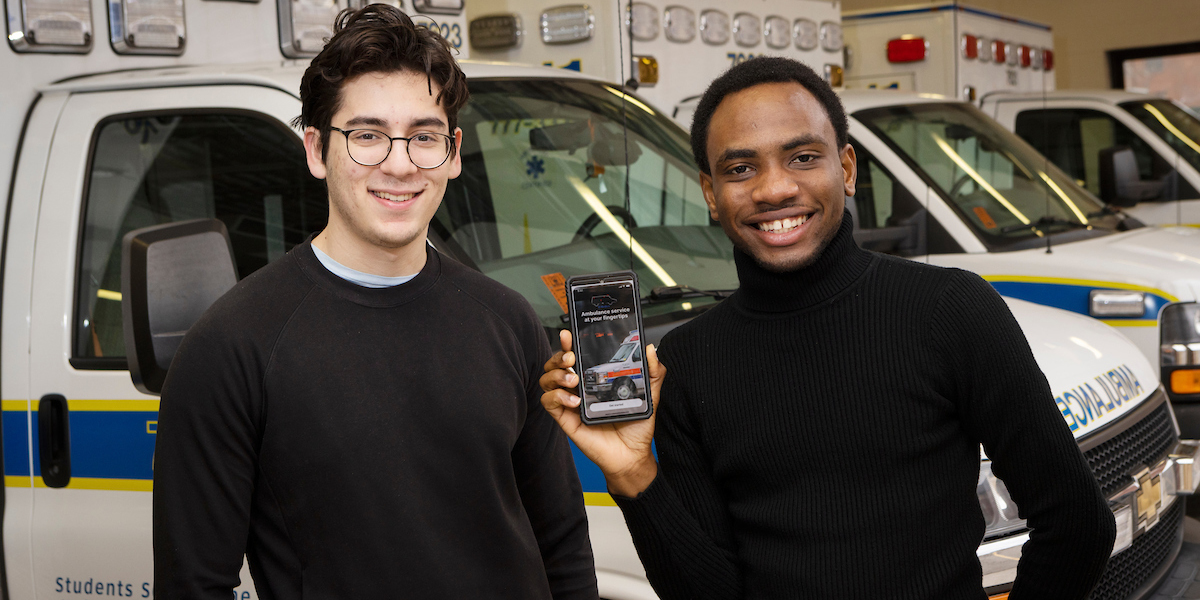Ambulance app project brings together students from three nations
Watson College students collaborate with peers at Vishwakarma University in India and the School of Integrated Innovation (ScII) at Chulalongkorn University in Thailand

When Americans have a medical emergency, they grab the phone to dial 911, and an ambulance is on the way in minutes. In other countries, though, folks are not so fortunate — and when help takes hours to arrive, the delay can be deadly.
What if there was an Uber-like app for ambulances that could summon assistance when needed? That was the idea behind a first-ever collaboration among students from the Thomas J. Watson College of Engineering and Applied Science, Vishwakarma University in India and the School of Integrated Innovation (ScII) at Chulalongkorn University in Thailand.
The Trinational Innovation and Entrepreneurship Immersion Program, which started in the fall 2022 semester, is an extension of the Design Thinking and Innovation Center of Excellence, a collaboration in Pune, India, between Vishwakarma and Binghamton University. It also aims to introduce students to the business possibilities available in Thailand’s neighbor, Singapore, which is a global leader in entrepreneurship.
Overseeing the program is Michael V. Testani, MS ’02, Watson College’s senior director of outreach and engagement. He wants the collaboration to focus on four popular technology sectors: medical, educational, agricultural and what’s been called industry 4.0, which integrates artificial intelligence and other advances into manufacturing to improve quality and supply-chain management.
“Our goal is to create a startup company that solves a problem that hasn’t been solved before, at least the way we’re solving it,” he says. “We’re hoping that new patents and products come out of this program, too.”
Two industrial and systems engineering students at Watson took part last fall: sophomore Kaan Asar and master’s student Daniel Osafehinti. Asar is at Binghamton through a dual-degree program with Istanbul Technical University in Turkey, while Osafehinti hails from Nigeria, so both understand the healthcare challenges that other countries face.
Also, part of the team were students Pratham Jain, Satyam Taware and Ahmed Memon from Vishwakarma (with Professor Kailas Patil as advisor), and Putt Thantiviramanon from Chulalongkorn (with Professor Pietro Borsano as advisor).
The trinational student team looked to the healthcare field for its inspiration. After kicking around some initial ideas, Osafehinti came up with an ambulance app for senior citizens, which they dubbed D-Medics. “Some people who die at the age of 60 could stay with us until 70 or even 90, but they cannot get medical care as fast as possible,” he says. “They cannot get to the hospital. That for me was an inspiration.”
One challenge the team members faced: The technology available to seniors in other countries often is not as advanced as the top-of-the-line Apple or Androidphones that users have in the U.S., so designing the app had to account for that.
And although options such as email, cloud computing and videoconferencing have made global collaborations easier, they also had to deal with practical concerns like when everyone could meet without it being the middle of the night.
“We were working through three different time zones, and we only had one hour that we could find each week to get together online,” Asar says. “It was 8 a.m. on Friday for us and 5:30 p.m. and 7 p.m. for other people, but we all made it work.”
Sometimes the ideas came at more awkward times. “Putt sent me an email once, and I was like, ‘Putt! It’s 3 a.m. in the U.S.!’ He had no idea,” Osafehinti says with a laugh.
Throughout the semester, the Trinational Innovation project’s three advisors offered guidance as the D-Medics app developed, and they also organized seminars about design thinking and business startup basics. Those lessons proved to be vital when managing time and the required workload.
“Since this project emphasizes team-building, a lot of it was done collaboratively. Almost every one of us has contributed to each task,” Thantiviramanon says. “The Binghamton students and I have expertise that is more business related, so we contributed more to business content, while the VU Pune students contributed more to the mobile application wireframes for the prototype.”
Although the team did not have enough time to make a working app before the end of the semester, all of them say they are proud of the work they accomplished.
“I feel that I have grown both professionally and personally as a result of this experience,” Memon says. “The skills and knowledge that I gained through this project undoubtedly will be of great value in my future endeavors.”
Osafehinti hopes future funding will help the D-Medics app become reality. This spring, the team entered the Lee Kuan Yew Global Business Plan Competition, sponsored by Singapore Management University and its Institute of Entrepreneurship and Innovation. Finalists will be announced in June.
“My favorite thing was getting to know everybody. Everybody had something to put on the table,” Osafehinti says. “Also, the professors were very, very supportive, and they were willing to hear us. Even though our backgrounds and time zones were different, they were there for us. I love that.”
